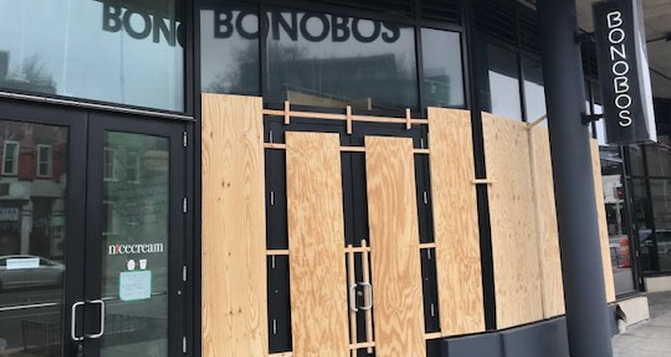Why storefronts are boarded up during COVID-19
Boarded-up storefronts are a stark visual reminder of the pandemic

A single store closed off might be a bit odd, but a neighborhood visually
closing adds to a supernatural feeling that is evoked as cities shut down
and grapple with how to support businesses but still keep local populations
safe.
While closing down a business may seem like a straightforward process, there are
operational logistics to consider. "It's not just setting the alarm and walking
out the back door. Especially since we don't know how long this is going to
last," Matt Garfield, managing director with FTI Consulting.
In part that means securing the store, talking with security, including local
police departments, and ensuring parking lots are safe.
Mall-based stores conceivably have to follow fewer operational procedures
because the larger building will have security protocols. But street-level
stores have to independently decide how to respond to city and government
ordinances to protect their property.
&uuid=(email)) The decision to board up storefronts may have roots in security concerns.
The decision to board up storefronts may have roots in security concerns.
New York City recorded an uptick in burglaries coinciding with the beginning
of the pandemic, according to a report by The Wall Street Journal. The New
York Police Department saw a 75% increase in burglaries of commercial businesses
from March 12 through March 31, compared to the same time the year prior,
according to the report.
Assets that are in play go beyond a retailer's physical building. As the
pandemic goes on, experts have discussed if more retailers should go dark
and, in effect, turn into distribution centers. Grocers in particular are seeing
the impact of keeping stores open as safety concerns for both employees and
shoppers mount. For other retailers, the products that are currently trapped in
dark stores are items that ultimately can fill a company's e-commerce pipeline.
Moving inventory out of stores is an option that many luxury retailers are
exercising, rather than shutting storefronts. That way the company's high-priced
products are protected, but the brand's presence is maintained in a city.
One of the risks of boarding up a store is that it may impact a brand's
image. As customers return to stores they may associate a previously
blocked location as being an unsafe place to shop. "I'm going to think,
'Wow, they're so nervous about getting broken into and something happening. This
is probably a bad area,'" Bruno Mota, co-founder and CEO of boutique consulting
and risk management firm Pembroke & Co.
"Some of those negative connotations that were built up may last, and
that in itself is going to be a loss."
Boarding up stores may not have a branding impact over large swaths of the
population, but it can still result in leaving consumers with an impression of
the retailer, he said. "Ninety percent of people are going to think it's no big
deal. But, when you're running on such low margins, losing one, two, or even
three percent of clientele right now can be disastrous."
And while some retailers have had clear communication as to how and why they are
physically shuttering their brick-and-mortar locations, others have had a
murkier response on their decisions.
Full article published on
retaildive.com